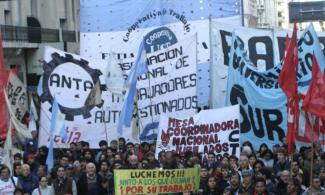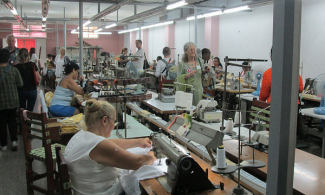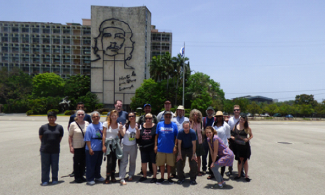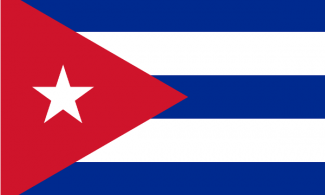
There was some extremely troubling news out of Argentina last week. On March 28th, the Melei administration Presidential Spokesman Manuel Adorni announced that the government would be suspending all worker co-ops created between 2020 and 2022 and auditing all those formed last year. While this official statement was quickly gainsayed by other government agencies, what had happened was just as bad: the National Institute of Associativism and Social Economy (INAES) – the agency responsible for registering co-ops – had voted to suspend 11,000 co-ops for lack of documentation and other alleged non-compliance.
At the press conference Adorni called the worker cooperatives a “political black box” that was being eliminated, and implied large scale illegality in co-op registrations. The announcement sent a chill down the spine of cooperators across the country. Karina Godoy of La Nirva cooperative told the Buenos Aires Herald that, “It felt like they threw a bucket of cold water on us.”
Fortunately, Godoy’s was not one of the cooperatives effected, but this move from the government is a major blow to the worker cooperative movement in Argentina as a whole, and thus for the international movement as well. Argentina is famed for it large number of worker co-ops – over 23,000 of them – and especially renowned are its empresas recuperadas por sus trabajadores (ERTs) or worker-recuperated enterprises. These cooperatives grew out of the economic crisis of 2001-02, when capitalist business owners stopped paying workers, shut down operations, and attempted to strip the businesses of assets. Workers and communities resisted, occupying the factories, hotels, and other businesses and claiming them in leiu of unpaid wages. They then converted them to worker cooperatives and continued operations. By 2018, there were 400 such ERTs in Argentina, employing close to 16,000 people1 2 . In fact, the current head of the International Cooperative Alliance is Argentinian Ariel Guarco, who also happens to sit on the board of INAES3 .
Given the prevelance and popularity of worker co-ops in the country, the government’s actions have drawn heated criticism. Alexadre Roig, former head of the INAES said that the government was using a “routine process...to generate an anticooperative political event.” In his announcement, Adorni implied that many co-ops were operating illegaly, pointing to 22% of members being involved in more than one co-op, and email and home addresses being shared by some as well. Roig, however, pointed out that most Argentinian workers have multiple jobs, and that co-ops often share office and warehouse space.
Adorni also questioned the recent rapid rise in the number of worker co-ops, increasing from about 10,000 to nearly 24,000 in just a few years. Roig however, pointed out that the cooperative registration process has been greatly streamlined, going from a two year process to one that now takes only two months. As for the failure to submit required documents, Noelia Viola of the suspended Giramundo cooperative TV channel told the Herald that the reason for their paperwork not being filed was the government changing the online platform used to submit records.
A final target of Melei administration’s spokesman were the 300 worker co-ops who have members who are involved with the Potenciar Trabajo subsidy program, which provides cash payments to adults in poverty or working in informal jobs, so long as they finish their studies or take part in community projects. Adorni claimed that tax-payer money was being used to fund cooperatives' operations. In their official statement, the Gathering of the Workers’ Economy responded to these allegations,
The State does not finance cooperatives, beyond potential subsidies or programs that they might be given; cooperatives live from our work. In the case of the Potenciar Trabajo plans of recent years, they are individual subsidies which, in many cases, are received by cooperative workers, thus complementing their income and contributing to their recovery in the face of the critical economic situation we are going through and which, in no way, is the responsibility of any cooperative or any worker.
Eduardo “Vasco” Murúa, of the Recovered Companies Movement also expressed shock and disdain for the administration’s actions. “They are firing workers from the state and the private sector, and now they are messing with cooperatives. This does not make sense even from the craziest ideology, not even from anarcho-capitalism.”
In their statement and call for solidarity, the Gathering of the Workers’ Economy (GWE) writes
[W]e demand the public retraction by the presidential spokesman of the lies and fallacies stated in his press conference of March 27th. We reject any advance of the intended measures against worker cooperativism. We demand the restitution of the programs and measures of cooperative promotion and support to the workers of our sector. And, we demand INAES to comply with its function of promotion and control of cooperatives and mutuals without taking punitive measures such as the above-mentioned resolutions, which must be immediately repealed.
We call on all self-managed workers; workers of cooperativism; and workers of the social, solidarity, and popular economy to mobilize to confront these measures. We also demand that the institutions of cooperativism and mutualism that make up the board of INAES explain their position and not be part of the anti-popular offensive of this government and repeal the resolution they have approved. We also call for strengthening the ties between the self-managed working class and the rest of the working class, especially with all trade union organizations and their centrals, to urgently launch a plan of struggle to defeat this project.
You can add your name to their statement here. As cooperators watching from afar, that might be the best we can do...well, that and maybe sending the ICA an email echoing the GWE’s demand that
This aggressive measure should also be explained by INAES – the representatives of cooperativism and mutualism – and their Board of Directors, starting with Ariel Guarco, who is also current president of the International Cooperative Alliance. [emphasis added]
- 1Andrés Ruggeri, Javier Antivero, Natalia Polti, Marcelo Vieta; The University of Buenos Aires’ Programa Facultad Abierta: Reflections on a Collaborative and Political–Academic University Extension Initiative with Argentina’s Self-Managed Workers; Alberta Journal of Educational Research, Vol. 64.2, Summer 2018, 194-201 https://www.academia.edu/37354617/The_University_of_Buenos_Aires_Programa_Facultad_Abierta_Reflections_on_a_Collaborative_and_Political_Academic_University_Extension_Initiative_with_Argentina_s_Self-Managed_Workers
- 2For a similarly recuperated worker co-op in the US, see the story of New Era Windows, for example here: https://www.yesmagazine.org/economy/2015/10/09/three-years-ago-these-chicago-workers-took-over-a-window-factory-today-theyre-thriving
- 3When the head of our international apex body is part of a massive purge of worker co-ops in his own country, we all have real reason to worry about the state of our movement.




Add new comment